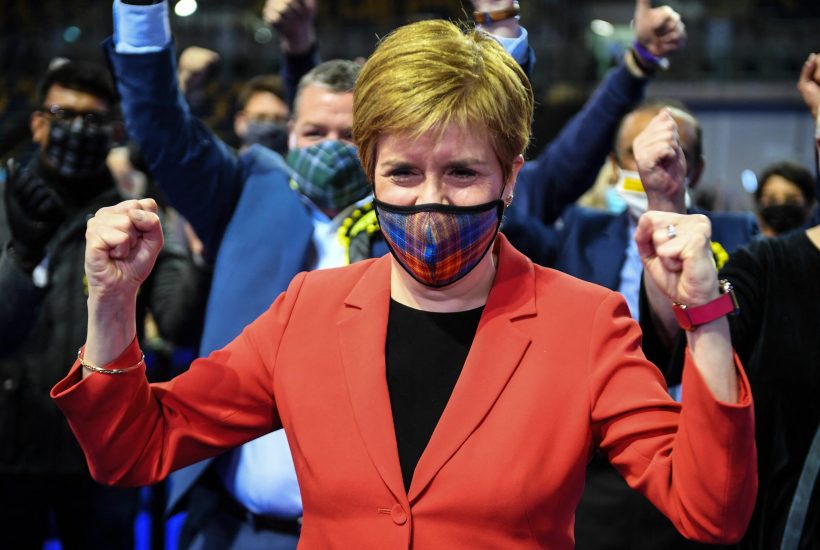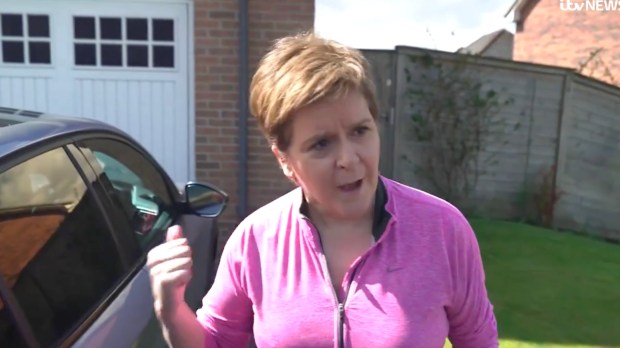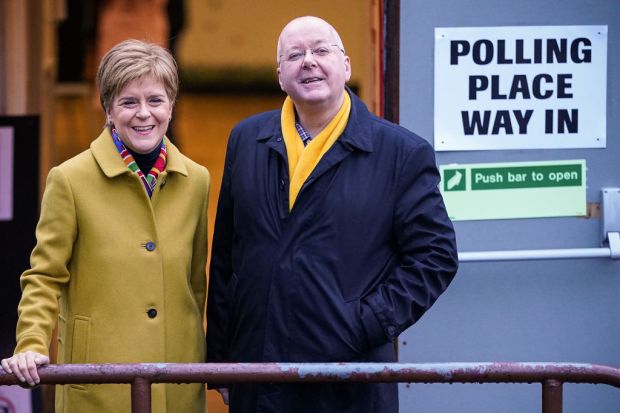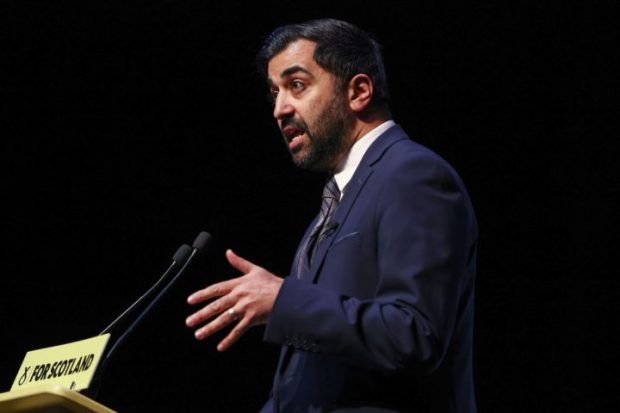The Scottish election is over but the battle for the winning narrative has only just begun. Clearly, in the eyes of most democrats, the SNP with 64 seats to the Conservatives’ 31 have won big time. But since the party was one tantalising seat short of clinching an overall majority (so much harder to achieve in proportional Holyrood than winner-takes-all, first-past-the-post Westminster), that is now being cast as a fail.
All day Saturday, BBC TV carried a rolling caption on its election special declaring that the SNP were ‘short of a majority’. It was the same story on Sky News whose Saturday night headlines proclaimed: ‘Nicola Sturgeon’s hopes of winning a majority uncertain; Labour maintain control of Senedd.’
Now, fair play. Welsh Labour won 30 of 60 Senedd seats, but technically that’s one short of an overall majority. But because the parliament’s presiding officer — supplied by an opposition party — doesn’t vote, Labour will probably not lose a budget or face a no-confidence vote. With eight Scottish Greens backing the SNP, it’ll be much the same stable story in Scotland. So is it fair to give such very different descriptions to the election victories of the SNP in Scotland and Labour in Wales?
Methinks the BBC and others are using the grammar of first-past-the-post British elections to describe the political landscape of proportional Scotland. It’s like comparing English apples and Scottish pears.
Now it’s true Nicola Sturgeon talked up the success of her own party rather than an independence majority. But no party leader ever publicly contemplates an outcome beyond wild success for their own political party during an election campaign, and during this one the SNP leader was keen to avoid the ‘supermajority’ talk of her rival Alex Salmond.
And in the end the numbers do not lie. The SNP didn’t clinch the 65 seats needed to govern at Holyrood in their own right. But that’s not the full picture. Not by a long chalk. In the proportional parliaments of Britain’s devolved nations and across most of the developed world, an outright win is nigh on impossible and what matters is achieving largest party status.
Angela Merkel’s ruling CDU for example has just 200 out of 709 seats in the German Bundestag — 28 per cent of the seats. Emmanuel Macron’s En Marche has 280 out of 577 in the National Assembly — a healthier 48.5 per cent. Nicola Sturgeon’s SNP now has 64 out of 129 — the healthiest of the lot on 49.75 per cent of the seats. So the SNP’s 2021 election victory is most definitely a win, but not as Westminster knows it.
In fact, the biggest difference between the Welsh and Scottish elections was the nature of the opposition. Unlike the SNP in Scotland, Welsh Labour did not face tactical voting of epic proportions by supporters of three pro-independence parties, prepared to hold their noses and vote for the most likely nationalist candidate to keep Labour out. In many ways, the Welsh elections were more like an old-fashioned election where voters actually back their preferred candidates. That last happened in Scotland in 2011, when — without prior warning — the SNP managed to break the bank by winning a whopping 69 of the available 129 seats — an overall majority.
It was the unprecedented and overwhelming nature of this victory that prompted David Cameron to call Alex Salmond’s bluff and hand Holyrood the powers to run the first official independence referendum in 2014. But those were different days. No one saw the SNP’s success coming back in 2011, so there was none of the tactical voting amongst Unionists then that has been rife in 2021, according to Sir John Curtice.
Setting 2011 as the achievable benchmark for SNP success is a bit like regarding a trip to the office on Christmas Day as an easily repeatable feat. In fact, the SNP’s system-defying 2011 victory was truly a ‘once in a generation’ result — and now the multiple parties of the Union have been well and truly warned about the SNP’s strength, an outright majority is unlikely ever to be seen in Scotland again.
That’s no reflection of SNP weakness. Au contraire. To contain the independence vote, Unionist parties are having to bend themselves out of shape and vote for opponents. I wonder how Scottish Labour supporters feel having helped Douglas Ross to become leader of the opposition.
Of course, all is fair in love, war and elections. And appearing to whine about the fairness of BBC descriptions and size of majorities does sound weak and nit-picking. But if anyone thinks relabelling a historic SNP victory will convince Scots that the drive towards indyref2 is over, they’re in for a big surprise. What at least half the Scottish population can see is a bigger SNP mandate than before since no one living here could be in any doubt that voting SNP would result in preparations for a second referendum. A similar, clear manifesto pledge was also made by the Scottish Greens.
Meanwhile, Boris bounce north of the border came there none. Again. So, good luck to Tory MSP Murdo Fraser who tweeted: ‘The majority of Scottish voters have backed parties standing on a platform opposing indyref2. Democracy demands that we listen to them.’
Democracy is a much simpler thing. It defines success as a parliamentary majority. The SNP and the Greens have won that in spades. And like it or loathe it, a second independence referendum is going to happen. Progressives like Anas Sarwar and Willie Rennie can decide whether to line up with the democracy-denying hard men of the Scottish Conservatives, or accept that Scottish politics and their parties’ fortunes will not recover until the popular demand for a second referendum is acknowledged.
Got something to add? Join the discussion and comment below.
Get 10 issues for just $10
Subscribe to The Spectator Australia today for the next 10 magazine issues, plus full online access, for just $10.




















Comments
Don't miss out
Join the conversation with other Spectator Australia readers. Subscribe to leave a comment.
SUBSCRIBEAlready a subscriber? Log in